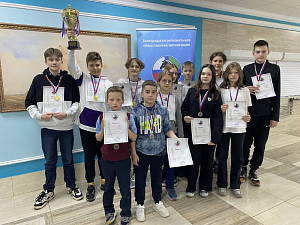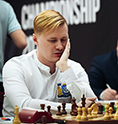9 June 2015
They did not return from the battlefield. Lev Kaiev
Grandmaster Evgeniy Solozhenkin looks into the fates of Soviet masters died in battle during the Great Patriotic War.
Lev Kaiev (1913–1942?)

"Died in battle in summer 1942" – B. Weinstein, Chess battles.
"Fell in battle on 31 March 1942 near the village Kholmiaki, Smolensk region" – Wikipedia.
Up to now the fate of a great talent from Penza province has not been called in question: chess eorganizer, passionate chess promoter, author of many chess compositions, Soviet master of sports Lev Alexeevich Kaiev was killed on the front.
Kaiev is well described in the publications Of those who never returned from the fields of battle and Chess player and soldier. To look through his chess studies see the following link.

Lev Kaiev visits chess players in Sterlitamak, 1935
The latter publication provides the text of the letter sent to the family of medical instructor Kaiev:
On 8 July Kaiev was summoned and filed acts in the Committee of Sports. Thus ended his chess life – he started a military life. On 3 October junior commander, medical instructor Kaiev went to the place where a division was formed – Chishmy station (near Ufa). On 10th of November a military echelon took his squadron westward, where the great Battle of Moscow was in progress. Since December Kaiev participated in Soviet offensive, and in January 1942 he went to hospital with a minor wound. After the hospital he was sent to the 447th separate medical and sanitary battalion, but on 12 March was called away to his regiment to the front line. On 18 March his division was renamed into the 64th Guard, and he proudly wrote about it to the family. In May 1942 his relatives got the sorrow letter:
"We inform you that your son Kaiev Lev Alexeevich went missing during the battle for the village Kholminka, Smolensk region, on March 31, 1942. Apparently he heroically perished like a Soviet hero and patriot, guardsman of our motherland. During four months of battles against the Nazi invaders your son approved himself as a real hero, having received a citation from the military commanders at various occasion. You can be proud of your son.
Head of Sanitary Corps 1202, army doctor of 3rd rank V. Salnikov".
Mind: Kholminka, but not "Kholmiaki", as it stands in Wikipedia. Yet, no name of Lev Kaiev is mentioned in the irrecoverable losses reports of the United Data bank!
Only one has the information on him gone missing in March 1942:
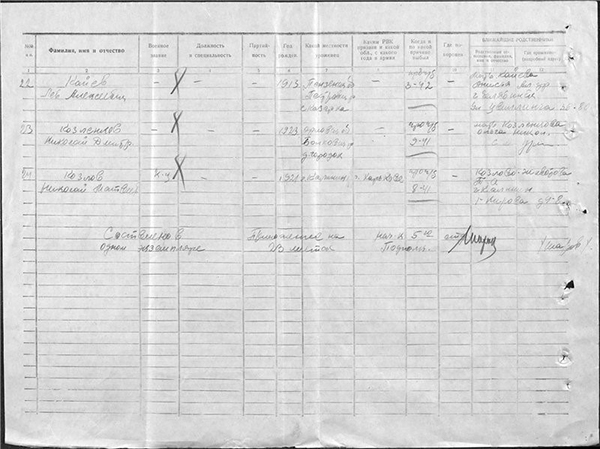
The Book of Memory also mentions the same fact.
The guess of Head of Sanitary Corps 1202 of the 361st rifle division (by the time the letter was written it has already been the 64th Guard rifle regiment of the 21st rifle division) about chess master's fate were words of support to his family and the reason for Wikipedia to put down March 31, 1942 as Lev Kaiev's date of death. But was true or not?
What was happening since March 30 in the village Kholminka, Sychevsky district, Smolensk region could be described as "Rzhev Slaughter".
April 1
The enemy occupied Pokusanka in segment of the 21st rifle division. 4 enemy tanks and 150 foot soldiers broke in Kholminka, where the battle began. The battle continued.
The enemy was driven from Kholminka. At 14:00 the enemy with 700 soldiers and 8 tanks occupied Kholminka again. Further advance of the enemy was blocked.
April 2
The 21st rifle division - At 10.00 2 enemy battalions and 8 tanks, artillery fire and 7 aircraft started attacking Dubki and the forest edge 1 km southward Dubki. Then came the battle for the village Dvoinia. Till 24.00 the enemy occupied Dubki, Vidnoe.
April 3
During the night the 21st rifle division attacked Kholminka three times, but they all were repelled by the enemy.
April 6
The 21st rifle division occupied Kholminka at 5:00. At 7:30 the enemy attack with 4 tanks from Lobany direction and took Kholminka back.
According to the lists of irrecoverable losses reports on March 31, 1942, 236 soldiers were killed in the 64th rifle regiment alone.
Yet, as we can see in the original lists, none of the names resembles Lev Alexeevich Kaiev born 1913 in Penza region. Here is a front page of the document:
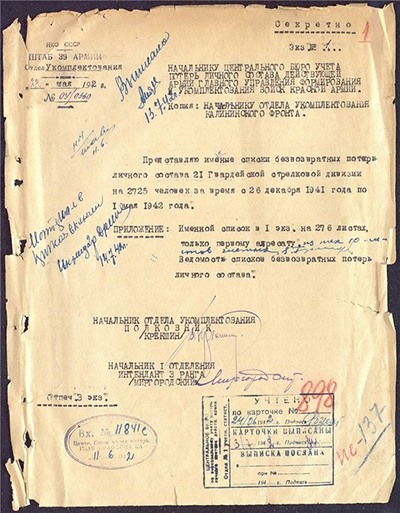
What grounds could be invoked in support of the Kaiev's death on March 31 in the battle for Kholminki? There are 236 soldiers who were listed being dead on this day from his regiment. It is a big number, but Kaiev was not mentioned there. Kholminka went from hand to hand, the whole place of arms for short time was controlled by our forces, so there could be an access to the dead body, if the body existed at all.
It seems that there were not many captives in the fighting on that day. I found only one card of a Red Army man captured in Kholminka on March 31, but he was from the 59th regiment (before the renaming it was the regiment № 1204, as it was written in his personal prisoner card), not from the 64th.
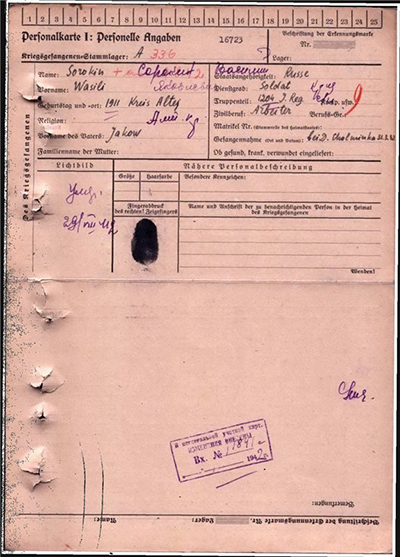
Last name: Sorokin
Name: Vasily
Patronymic name: Yakovlevich
Date of birth/Age: __.__.1911
Birth place: Altai
Camp number: 16723
Capture date: 31.03.1942
Capture place: Kholminka
Camp: stalag 336
Fate: Died being a captive
Military rank: common soldier
Date of death: 29.08.1942
Place of disposition: Kovno-Kaunas
Last name (in Latin characters): Sorokin
Name of information source: Central Archives of Ministry of Defense of the Russian Federation
Fund number of information source: 58
Register number of information source: 977521
File number of information source: 1460
So, what could happen to master Kaiev?
He might have been wounded, captured, transported to the camp for prisoners in Vyazma or in Rzhev camp. The United Data bank "Memorial" contains the list of soldiers and Red Army commanding officers, which consists of 5416 people, died in German hospitals of Vyazma:
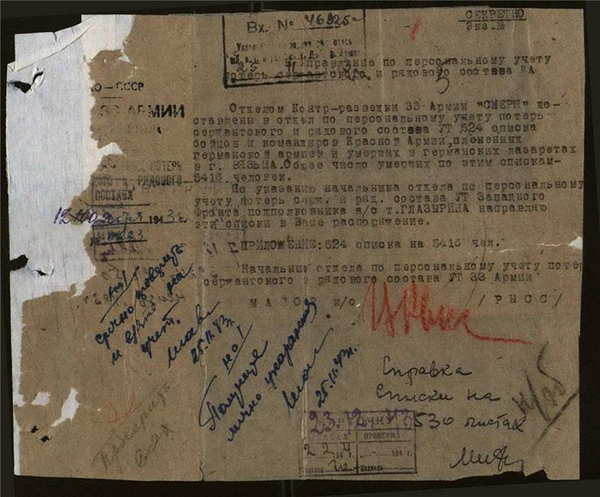
Among the hospital documents are reports listing unknown prisoners' arrival to the hospital, "unconscious and void of documents".
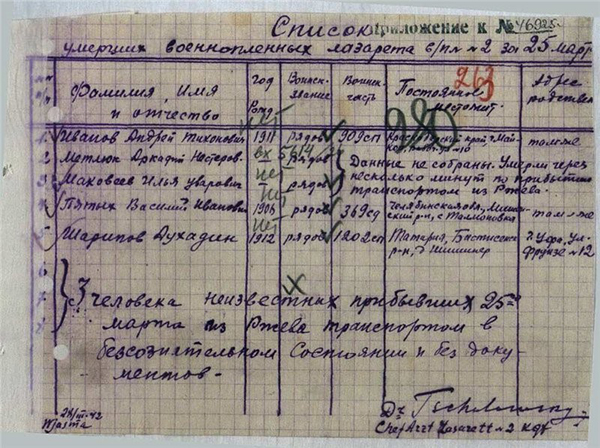
Maybe the master Lev Alexeevich Kaiev did not die on 31 March 1942 near the village Kholminka.
Sources:
B. Weinstein, Chess battles (FiS, М. 1985)
Magazine Belskye prostory
The United Data bank Memorial














